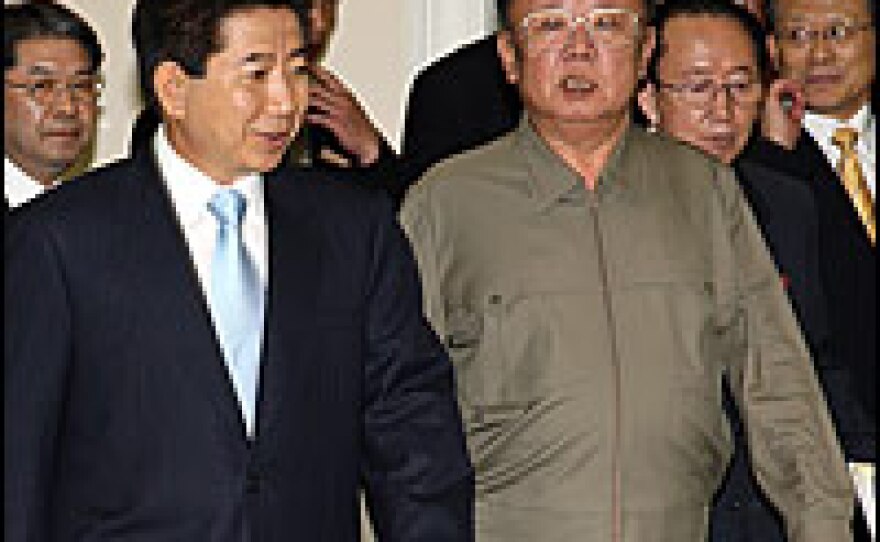
North Korea has agreed to disclose the extent of its nuclear program and disable its main reactor complex by the end of the year under an agreement reached during six-nation talks in Beijing on Wednesday.
Chinese Vice Foreign Minister Wu Dawei said the agreement calls for the U.S. to take the lead in seeing that the facilities are disabled and will fund those initial activities.
"The disablement of the five megawatt experimental reactor at Yongbyon, the reprocessing plant at Yongbyon and the nuclear fuel rod fabrication facility at Yongbyon will be completed by 31 December 2007," Wu said.
Bush Praises Agreement
The agreement came after negotiations between China, the United States, Japan, Russia, South Korea and North Korea. It was lauded by the United States, with the White House calling it significant progress toward a denuclearized Korean Peninsula.
"President Bush welcomes today's announcement," said Gordon Johndroe, spokesman for the White House's National Security Council. "These second-phase actions effectively end the DPRK's (Democratic People's Republic of Korea) production of plutonium — a major step towards the goal of achieving the verifiable denuclearization of the Korean Peninsula."
Multiphase Agreement
Johndroe's remarks made reference to a February agreement reached between Pyongyang, North Korea's capital city, and the other five countries. In the first phase of that agreement, Pyongyang was required to shut down and seal its Yongbyon reactor facility, which it did in July. The second phase required it to disable its sole functioning reactor at Yongbyon and provide a full description of all its nuclear programs.
Wednesday's agreement calls for that to happen by the end of the year.
In return, the United States will remove North Korea from a list of countries that sponsor terrorism, a key demand of Pyongyang. No timetable was set for this action and is dependent upon the North Korean government following through on its commitment.
The multiparty talks on North Korea have dragged on for four years. But if the initiative ultimately is successful, it would roll back a nuclear program that a year ago allowed North Korea to detonate a nuclear device and that experts say may have produced more than a dozen nuclear bombs.
North, South Korean Leaders Meet
Meanwhile, the two Koreas decided Wednesday to stick to their original schedule and not extend their first summit in seven years after the North Korean leader said there had been enough dialogue between the sides.
"As we had enough dialogue, we don't need to extend" the summit, Kim said after the end of a second session of talks Wednesday with South Korea's Roh, according to South Korean pool reports. The leaders shook hands at the end of their meetings, both appearing cheerful in video relayed from Pyongyang.
Earlier, Kim had proposed the meeting be extended so that Roh could enjoy a casual lunch Thursday with the North Korean leader. However, Roh did not immediately agree and said he would consult with advisers.
It was not clear whether Roh rejected the offer first or if Kim took it back of his own accord.
The two countries are to issue a joint statement Thursday morning, according to pool reports.
Leaders Find Common Ground
Roh said he had sought common ground with Kim as they opened formal talks in Pyongyang for only the second-ever summit between the countries.
"We didn't reach consensus on everything. There were parts on which our perceptions coincided, and there were other parts" on which the perceptions did not coincide, Roh said at a luncheon with the South Korean delegation during a pause in his talks with Kim.
"However, what I clearly confirmed is that [Kim] has a firm will about peace and there was consensus that there should be an agreement this time that presents a future direction about peace," Roh said.
More Work to Do
Roh acknowledged that the North, one of the world's most isolated nations, was taking a cautious approach in opening up to its capitalist neighbor.
"North Korea still has some skepticism about the South, and doesn't trust it enough," Roh told the luncheon. "We have to make more efforts to further tear down this wall of distrust."
He also said the North expressed regret that the international standoff over its nuclear weapons programs had prevented greater economic cooperation with the South.
As the summit started Wednesday, Roh and Kim briefly mentioned recent floods in the North that left about 600 people dead or missing and tens of thousands homeless and prompted North Korea to delay the summit from its original August date.
Kim appeared animated and smiled repeatedly Wednesday as he greeted Roh — a contrast from his dour demeanor Tuesday, when the two first met briefly at an outdoor welcoming ceremony after the South Korean president arrived in Pyongyang.
From NPR reports and The Associated Press
Copyright 2022 NPR. To see more, visit https://www.npr.org. 9(MDAzMjM2NDYzMDEyMzc1Njk5NjAxNzY3OQ001))





